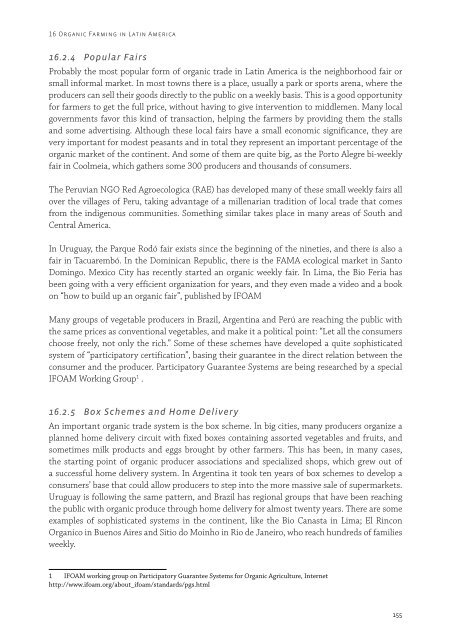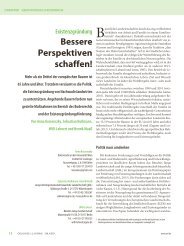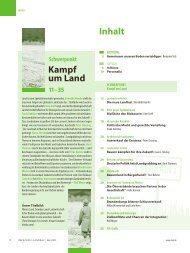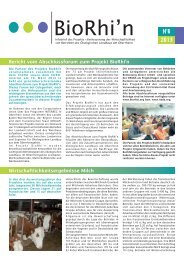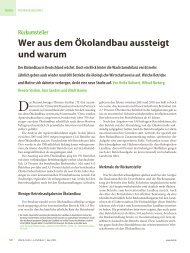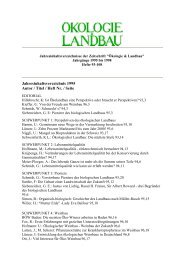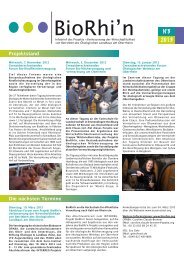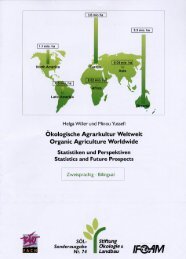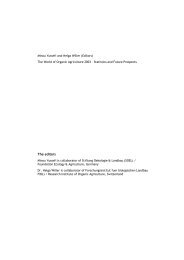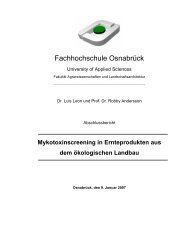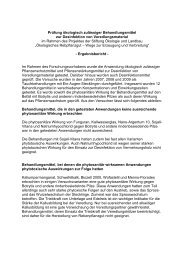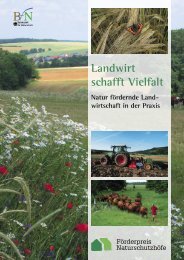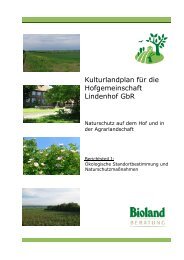the world of organic agriculture - Organic Eprints
the world of organic agriculture - Organic Eprints
the world of organic agriculture - Organic Eprints
You also want an ePaper? Increase the reach of your titles
YUMPU automatically turns print PDFs into web optimized ePapers that Google loves.
16 <strong>Organic</strong> Farming in Latin America<br />
16.2.4 Popular Fairs<br />
Probably <strong>the</strong> most popular form <strong>of</strong> <strong>organic</strong> trade in Latin America is <strong>the</strong> neighborhood fair or<br />
small informal market. In most towns <strong>the</strong>re is a place, usually a park or sports arena, where <strong>the</strong><br />
producers can sell <strong>the</strong>ir goods directly to <strong>the</strong> public on a weekly basis. This is a good opportunity<br />
for farmers to get <strong>the</strong> full price, without having to give intervention to middlemen. Many local<br />
governments favor this kind <strong>of</strong> transaction, helping <strong>the</strong> farmers by providing <strong>the</strong>m <strong>the</strong> stalls<br />
and some advertising. Although <strong>the</strong>se local fairs have a small economic significance, <strong>the</strong>y are<br />
very important for modest peasants and in total <strong>the</strong>y represent an important percentage <strong>of</strong> <strong>the</strong><br />
<strong>organic</strong> market <strong>of</strong> <strong>the</strong> continent. And some <strong>of</strong> <strong>the</strong>m are quite big, as <strong>the</strong> Porto Alegre bi-weekly<br />
fair in Coolmeia, which ga<strong>the</strong>rs some 300 producers and thousands <strong>of</strong> consumers.<br />
The Peruvian NGO Red Agroecologica (RAE) has developed many <strong>of</strong> <strong>the</strong>se small weekly fairs all<br />
over <strong>the</strong> villages <strong>of</strong> Peru, taking advantage <strong>of</strong> a millenarian tradition <strong>of</strong> local trade that comes<br />
from <strong>the</strong> indigenous communities. Something similar takes place in many areas <strong>of</strong> South and<br />
Central America.<br />
In Uruguay, <strong>the</strong> Parque Rodó fair exists since <strong>the</strong> beginning <strong>of</strong> <strong>the</strong> nineties, and <strong>the</strong>re is also a<br />
fair in Tacuarembó. In <strong>the</strong> Dominican Republic, <strong>the</strong>re is <strong>the</strong> FAMA ecological market in Santo<br />
Domingo. Mexico City has recently started an <strong>organic</strong> weekly fair. In Lima, <strong>the</strong> Bio Feria has<br />
been going with a very efficient organization for years, and <strong>the</strong>y even made a video and a book<br />
on “how to build up an <strong>organic</strong> fair”, published by IFOAM<br />
Many groups <strong>of</strong> vegetable producers in Brazil, Argentina and Perú are reaching <strong>the</strong> public with<br />
<strong>the</strong> same prices as conventional vegetables, and make it a political point: “Let all <strong>the</strong> consumers<br />
choose freely, not only <strong>the</strong> rich.” Some <strong>of</strong> <strong>the</strong>se schemes have developed a quite sophisticated<br />
system <strong>of</strong> “participatory certification”, basing <strong>the</strong>ir guarantee in <strong>the</strong> direct relation between <strong>the</strong><br />
consumer and <strong>the</strong> producer. Participatory Guarantee Systems are being researched by a special<br />
IFOAM Working Group 1 .<br />
16.2.5 Box Schemes and Home Delivery<br />
An important <strong>organic</strong> trade system is <strong>the</strong> box scheme. In big cities, many producers organize a<br />
planned home delivery circuit with fixed boxes containing assorted vegetables and fruits, and<br />
sometimes milk products and eggs brought by o<strong>the</strong>r farmers. This has been, in many cases,<br />
<strong>the</strong> starting point <strong>of</strong> <strong>organic</strong> producer associations and specialized shops, which grew out <strong>of</strong><br />
a successful home delivery system. In Argentina it took ten years <strong>of</strong> box schemes to develop a<br />
consumers’ base that could allow producers to step into <strong>the</strong> more massive sale <strong>of</strong> supermarkets.<br />
Uruguay is following <strong>the</strong> same pattern, and Brazil has regional groups that have been reaching<br />
<strong>the</strong> public with <strong>organic</strong> produce through home delivery for almost twenty years. There are some<br />
examples <strong>of</strong> sophisticated systems in <strong>the</strong> continent, like <strong>the</strong> Bio Canasta in Lima; El Rincon<br />
<strong>Organic</strong>o in Buenos Aires and Sitio do Moinho in Rio de Janeiro, who reach hundreds <strong>of</strong> families<br />
weekly.<br />
1 IFOAM working group on Participatory Guarantee Systems for <strong>Organic</strong> Agriculture, Internet<br />
http://www.ifoam.org/about_ifoam/standards/pgs.html<br />
155


